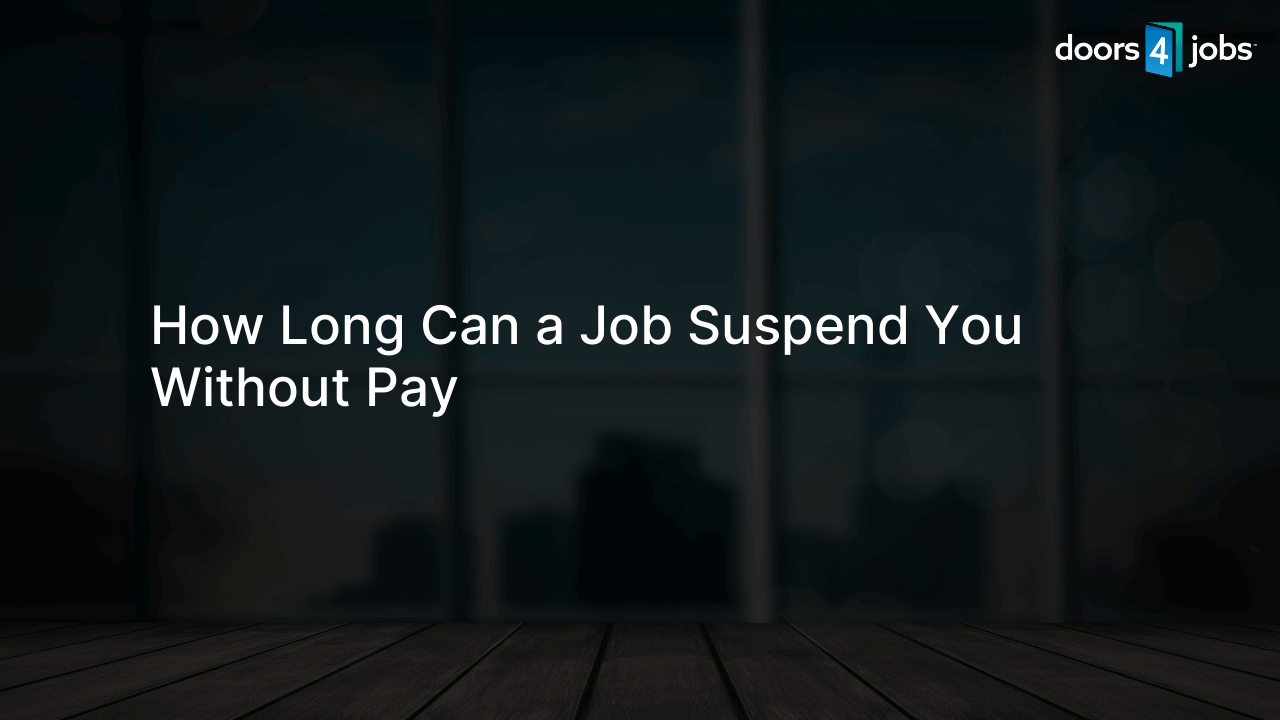A job can suspend you without pay for a varying duration depending on factors such as your employment contract, company policies, and the suspension reason. However, typically, a suspension may last from a few days to several weeks. It’s crucial to consult your employer and consult labor laws in your jurisdiction for specific details and rights regarding unpaid suspensions.
Understanding Job Suspension Without Pay
A job suspension without pay occurs when an employer temporarily removes an employee from their position while withholding their pay. This situation typically arises due to performance issues, policy violations, or as a consequence of an ongoing investigation.
Factors Affecting Suspension Duration
The length of a job suspension without pay may depend on several factors such as:
- Employment contract: The terms and conditions outlined in your contract can determine the duration of a suspension.
- Company policies: Each company has specific guidelines regarding disciplinary actions and procedures, which can influence your suspension length.
- Suspension reason: The seriousness of the misconduct and necessity for further investigation can impact the suspension period.
Federal and State Labor Laws
Labor laws vary depending on your jurisdiction, and it’s essential to acquaint yourself with these regulations to ensure your rights are protected during a suspension. In the U.S., the Fair Labor Standards Act (FLSA) establishes minimum wage, overtime pay, recordkeeping, and youth employment standards but does not specify guidelines for unpaid suspensions. State and local laws may offer additional protection and guidelines, so consulting an employment attorney is recommended.
Unionized Employees
If you’re a unionized employee, a collective bargaining agreement (CBA) may dictate the rules and duration of suspensions. Ensure to review your CBA and consult with your union representative to understand your rights and advocate for your interests.
Handling Job Suspension Without Pay
If you’re faced with a job suspension without pay, consider taking the following steps:
- Review your employment contract and company policies: Familiarize yourself with any relevant agreements and guidelines to determine the suspension’s legitimacy and duration.
- Seek legal advice: Consult an employment attorney or your union representative to better understand your rights and possible courses of action.
- Maintain documentation: Keep a written record of conversations, emails, and correspondence related to the suspension, as this could be useful should any disputes or legal actions arise.
- Stay professional: Regardless of the circumstances, maintain a professional demeanor and avoid escalating the situation unnecessarily.
Communication with your Employer
Effective communication with your employer is a crucial factor during a job suspension. Make sure to address any questions or concerns you may have openly and transparently. This approach can often lead to a better understanding of the situation and expectations on both sides. Moreover, it allows you to clarify your position and receive updates on the ongoing investigation, if applicable.
Considering Alternative Dispute Resolution
If you feel that the suspension is unjustified or disproportionate, you might want to consider alternative dispute resolution (ADR) methods. ADR can help you settle differences through mediation or arbitration, providing a neutral space where both parties can discuss and find a resolution to their issues. Though not always applicable, engaging in ADR could lead to a faster and more cost-effective resolution than traditional litigation.
Preparing for Reinstatement
If the suspension is lifted and you are allowed to return to work, it is essential to be prepared for reinstatement. During the suspension period, it can be beneficial to reflect on past incidents, learn from them, and have a proactive plan to avoid repeating mistakes. Showing your commitment to improvement and rebuilding trust with your employer is vital for reintegrating smoothly.
Exploring Job Alternatives
A suspension without pay can make you reevaluate your current job situation, and may open up new possibilities that you previously did not consider. Use the time away from work to assess your career goals, explore alternative employment opportunities, or look into building additional skills through training or education. Having a plan for possible change can ensure that you are prepared for whatever outcomes may arise from the suspension.
FAQ Section: Job Suspension Without Pay
In this section, we answer common questions related to job suspension without pay, providing quick and concise information to help you better understand the situation and what to expect during a suspension.
Can an employer suspend me without pay legally?
Yes, an employer can legally suspend you without pay, depending on your employment contract, company policies, or union agreements. However, it’s important to review federal, state, and local labor laws or consult with an employment attorney to ensure your rights are protected.
How will the suspension without pay affect my benefits?
The impact of a suspension without pay on your benefits depends on your employer’s policies and the terms of your employment contract. For instance, some companies may continue providing health insurance during the suspension period, while others may not. It’s essential to consult your company’s HR department and review your employment agreement to understand how your benefits may be affected.
Should I start looking for a new job immediately?
Whether to start looking for a new job during a suspension largely depends on the severity of the situation, the likelihood of your reinstatement, and your personal employment goals. Taking the time to evaluate your long-term career goals and considering alternative opportunities is generally a wise move.
Can I appeal a job suspension without pay?
Appealing a suspension without pay depends on your company’s policies, your employment contract, or union agreements. In some situations, you may be able to formally appeal the decision through internal processes or by seeking the help of an employment attorney or union representative.
Do I have to disclose my suspension to future employers during the interview process?
While there is no legal obligation to disclose your suspension, it’s advisable to be honest and upfront if asked about your employment history or reasons for leaving your previous job. Be prepared to discuss the circumstances and emphasize your efforts to rectify the situation or the lessons learned from the experience.











